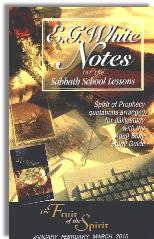|
||||||||||||||
Commentary on "The Fruit of the Spirit is Kindness"
Day 7: Friday, February 5, 2010
Overview
Finally Friday's lesson brings some questions that are intended to prolong the discussion previously started in the other days. One of them seems to be particularly important for Adventists—one about perfection: " Review the texts this week that talked about us being ‘perfect’. How should we understand what this idea means? What are the common problems and misconceptions that we as a church have struggled with over the use and meaning of this term?"
Observations
Perfection and perfectionism identify the most difficult subject that Adventists have to deal with if they don't abandon completely the sanctuary and investigative judgment doctrine. The historic Adventists sustain a belief in a "perfect" perfection: sinlessness and complete victory over every particular sin. Other Adventists, lincluding our author, favor a "love" definition of perfection, something different from sinlessness but nevertheless something superior to what the Adventist church experiences today (Colossians 3:14). During the entire week, the author tried to guide the attention of his readers toward the pursuit of a bright and shining experience within the church, an experience where love and kindness would be so evident that the Adventist message would have a powerful impact in the world. As Ellen White said, “If we would humble ourselves before God, and be kind and courteous and tenderhearted and pitiful, there would be one hundred conversions to the truth where now there is only one.”
It is indirectly suggested that the fact that perfection is not understood as love toward one another in the community of the Adventist faith constitutes a problem. Our author does not mention this idea directly, but a quote from Ellen White is highly important in the context of the sanctuary and investigative judgment, the final generation, and so on:
"Christ is waiting with longing desire for the manifestation of Himself in His church. When the character of Christ shall be perfectly reproduced in His people, then He will come to claim them as His own" (COL 69).
Many Adventists feel that the historic Adventists with their insistence on sinless perfection have derailed the church. What the church needs, they counter, is a manifestation of love in such a way that their kindness and selfless love will match Christ's sacrificial love and lack of selfishness. Still, by redefining perfection, the basic error of making Christ's second coming dependent on human accomplishments remain intact. It makes God dependent on people's progress in sanctification, robbing God of sovereignty and missing the central point: believers are perfect in Christ, and this perfection is sufficient (Hebrews 10:14). Christ's righteousness is perfect and sufficient; believers don't need to be perfect in sanctification no matter how this perfection is defined.
The church doesn't need to be perfect in itself in order to be prepared and ready for heaven; it is already perfect because Christ shed his blood and made believers perfect for all time. In order to have this perfect righteousness, people must get rid of any other kind of righteousness; they must renounce their belief that they (with God's help, of course) can and must become perfect in their life. The gospel is a double announcement: man's failure to be perfect as God requires and Christ's perfection imputed, given as a free gift to the believer. One cannot be true without the other.
Summary
- Perfectionism is the universally difficult subject all Adventists must address.
- Historic Adventists still believe in sinless perfection as the goal of sanctification.
- Other Adventists define “perfection” as having love like Christ’s.
- Ellen White mandates some sort of perfection, stating that God is waiting to return until His people have “perfectly reproduced” the character of Christ.
- The belief in any sort of perfection makes Christ’s second coming dependent upon the efficiency of man in accomplishing this mandate.
- This stance robs God of His sovereignty and eclipses the main point: the perfection required is Christ’s personal righteousness—alien to each human—that is imputed to those who believe.
- The gospel is a double announcement: man is a failure at any degree of perfection, and Christ’s perfection is a free gift to the believer.
Copyright 2010 BibleStudiesForAdventists.com. All rights reserved. Revised February 3, 2010. This website is published by Life Assurance Ministries, Glendale, Arizona, USA, the publisher of Proclamation! Magazine. Contact email: BibleStudiesForAdventists@gmail.com.
The Sabbath School Bible Study Guide and the corresponding E.G. White Notes are published by Pacific Press Publishing Association, which is owned and operated by the Seventh-day Adventist church. The current quarter's editions are pictured above.
Official Adventist Resources
Standard Edition Study Guide Week 6
Teacher's Edition Study Guide Week 6
Easy Reading Edition Study Guide Week 6
Search the Complete Published Ellen G. White Writings


